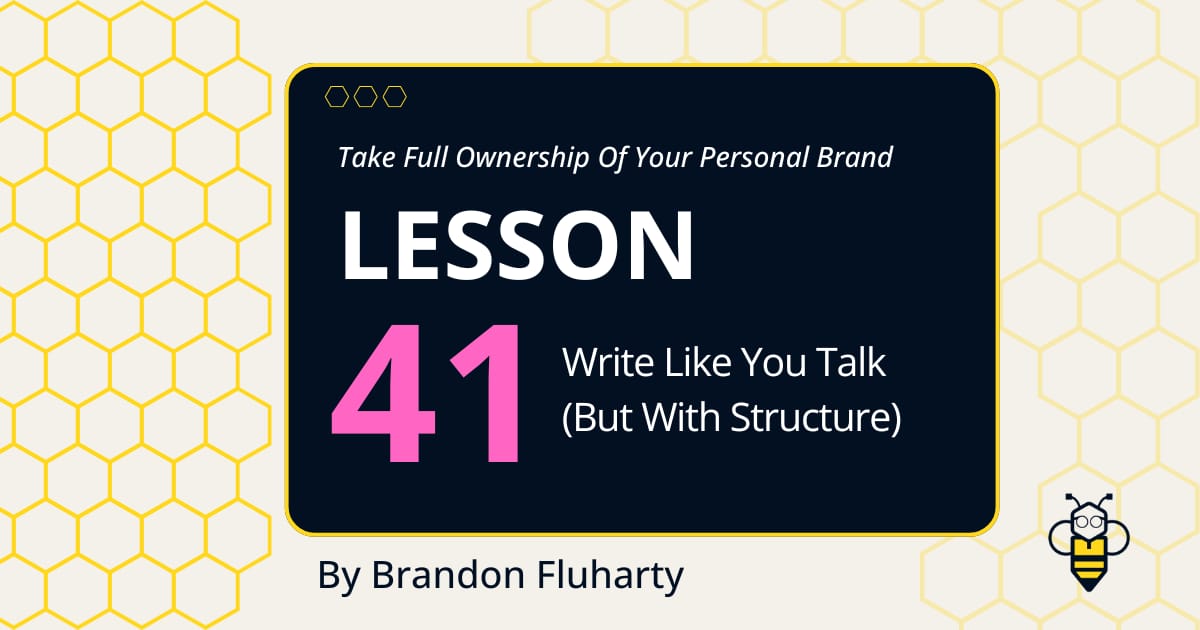



Most strategic sellers write like they're drafting procurement documents—formal, lifeless, forgettable.
The ones who build real visibility write like they're explaining complex ideas to a smart friend over coffee.
This week, you'll discover your authentic authority voice: the style that makes your expertise both credible and magnetic. Stop sounding like everyone else and start sounding like yourself.
Total points up for grabs: 25

The credibility trap that kills your voice before anyone hears it
“Don't use words too big for the subject. Don't say 'infinitely' when you mean 'very'; otherwise you'll have no word left when you want to talk about something really infinite.”
Here's what happens when most strategic sellers try to build visibility: they freeze.
They open LinkedIn. They stare at the blank post box. They think "I should share something valuable." Then they write something that sounds like it was approved by three layers of corporate legal:
"Excited to share insights on leveraging strategic synergies to drive transformational outcomes in the enterprise SaaS ecosystem..."
Nobody reads past the first sentence. Because nobody talks like that.
The paradox of professional writing is this: the more you try to sound authoritative, the less authority you actually project. Real authority comes from clarity, not complexity. From confidence, not corporate speak. From writing like you actually think and talk, just with better structure.
Think about the last time someone explained something complex to you in a way that actually clicked. They probably didn't use buzzwords. They used metaphors. Stories. Simple language. They talked like a human, not a bot.
That's the voice that builds visibility. Not the one that sounds "professional." The one that sounds like you—just organized and intentional.
Every seller who builds a meaningful following has cracked this code. They write the way they'd explain something in a deal. The way they'd break down a complex concept to an executive. The way they'd coach a colleague over coffee. Conversational but structured. Accessible but not too casual. Clear but not dumbed down.
This is your authentic authority voice. And finding it isn't about becoming a "better writer." It's about writing the way you already talk, then adding just enough structure to make it scannable and memorable.

From corporate robot to trusted voice
"Easy reading is damn hard writing."
A lot of my early LinkedIn posts were me just reposting my employer’s links with no personal context (like this one) or regurgitating our Marketing jargon (like this one).
I was trying so hard to sound like a thought leader that I sounded like nobody at all.
The breakthrough came during a customer presentation to Subway. I was explaining our Conversational AI platform to their VP of Guest Experience—let's call him Michael—and I caught myself mid-sentence using the exact corporate language from my early LinkedIn posts.
Michael interrupted me: "Brandon, I get that this is sophisticated technology. But can you just tell me what actually happens when a customer uses this? Like, walk me through it as if I'm the guest."
So I did. I told him the story of my own experience using LivePerson's technology at the Cosmopolitan Hotel in Vegas. How I texted a digital concierge named "Rose." How she recommended restaurants, booked a spa appointment, and even coordinated with the valet—all through conversational text. How it felt like having a personal assistant without having to call anyone or wait at a desk.
No buzzwords. No "strategic implications." Just a story about a real experience that solved a real problem.
Michael leaned back and said, "That's what I needed to hear. Why didn't you just start with that?"
That night in my hotel room, I made a commitment to start writing my LinkedIn posts from personal experience (like this one).
It got 4-5x the engagement of anything I'd written before. But more importantly, once I got comfortable writing more on LinkedIn, I was even being recognized by prospective clients, and they were referencing my pieces in meetings.
From that point on, I stopped trying to sound impressive and started trying to sound like myself. Every post became a test: "Would I actually say this to an executive in a real conversation?" If not, I rewrote it.
The shift wasn't just about engagement metrics. It was about trust. People don't connect with credentials. They connect with clarity. With personality. With someone who can take sophisticated concepts and make them accessible without making them simple.
That's what your authentic authority voice does. It doesn't dumb things down. It makes complex ideas clear. It doesn't sacrifice credibility. It builds it through clarity.
There are seven parts to developing your authentic authority voice (and begin writing in a way that opens more doors). Let’s break it down…
To access, you must be a member
Become a member of The Purposeful Performer to get unlimited access to this lesson and other member-only content.
UpgradeThe Professional Membership provides:
- Full access to The Purposeful Performer
- Book 1:1 coaching w/ me at a discounted rate
- Community with other pros like you
- Group strategy sessions






